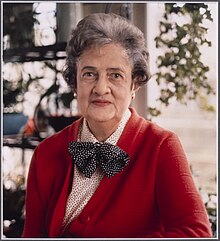A00336 - The Cardozo Sisters
In my last Memorial List post, I mentioned that Harold Over Lewis, Amherst College Class of 1929, was married to Catherine Cardozo Lewis, one of the three Cardozo sisters who operated a very successful hair care business in Washington, D. C. for 50 years. In the years between 1976 and 1981, Harvard University sponsored an Oral History Project which interviewed prominent African American women of the age of 70. The transcripts are described as follows:
Elizabeth Cardozo Barker
As a child, Elizabeth Cardozo Barker spent her summers playing and working in and around the beauty shop run by her grandmother, Emma Jones Warrick, in Atlantic City, N.J. The founder of Cardozo Sisters Hairstylists in Washington, D.C., in 1928, Mrs. Barker was assisted in the business by two sisters, Margaret Cardozo Holmes and Catherine Cardozo Lewis (both BWOHP interviewees). The firm was influential in the growth of the Black beauty industry in the city, providing their employees with first-rate training and optimum conditions for career advancement. As a member of the Board of Cosmetology, Mrs. Barker saw to it that all beauty and barber shops were required to serve customers of all races; she was also largely responsible for the integratlon of beauty schools in the area and for the improvement of operator education, insisting that certificates be granted for various levels of expertise.
Margaret Cardozo Holmes
Margaret Cardozo Holmes has contributed her artistic talent and scientific curiosity to the development of Cardozo Sisters Hairstylists, founded by her sister, Elizabeth Cardozo Barker, in 1928. She first learned about working with hair as a child in her grandmother's prosperous beauty shop in Atlantic City and was influenced by her aunt, the noted sculptress, Meta Warrick Fuller, who wished to adopt her and train her as an artist. In becoming a hair stylist she found an outlet for her talents. With her knowledge of the chemistry of hair, she has helped manufacturers develop new products for relaxing hair. She worked with her sisters to make Cardozo Sisters one of the most successful beauty shops in Washington, D.C., known for its ability to care for and style all types of hair. Her high standards for the employees raised the shop to a professional level unusual for the industry in the 1930s. In charge of personnel for the shop, she offered rehabilitation, training, and jobs for Black women who could not take full-time jobs. Mrs. Holmes is married to Eugene Clay Holmes, who was a professor of philosophy at Howard University.
Catherine Cardozo Lewis
Catherine Cardozo Lewis contributed her organizational talents and business skills to Cardozo Sisters Hairstylists, founded by her sister Elizabeth Cardozo Barker in 1928. The youngest child of Francis L. and Blanche Warrick Cardozo, Catherine attended a convent school in Philadelphia and Spelman Seminary before graduating from Dunbar High School. While attending Hunter College, she married Harold O. Lewis and soon transferred to Pratt Institute to study dressmaking. After her husband's graduation from college, the couple moved to Washington, where Mrs. Lewis worked in the Census Bureau until she became ill. She returned to work first as a volunteer secretary to the local Rochdale Co-op and the Garfield Heights Citizens' Association. She then worked at the Co-op as a paid employee, earning bookkeeping. In 1949 she joined Cardozo Sisters, serving as general manager until her retirement in 1965. She has continued to assist her husband, a member of the history department at Howard University, with his research on Black seamen.
Elizabeth Cardozo Barker | |
|---|---|
 | |
| Born | 1900 Washington, D.C., U.S. |
| Died | November 24, 1981 (aged 80) |
Elizabeth Cardozo Barker (1900 – 1981) was the founder of Cardozo Sisters Hairstylists in Washington, D.C.[1][2] She was also a president of the D.C. Cosmetology Board.[3]
Biography
[edit]Elizabeth Cardozo Barker was born in Washington, D.C., where she lived until she retired in 1970.[3] She was interviewed for the Black Women Oral History Project along with both of her sisters, Margaret Cardozo Holmes and Catherine Cardozo Lewis. In 1928, she founded, and the three of them later ran together, Cardozo Sisters Hairstylists.[2][4] Barker worked as a typist at Howard University and as a manager of the Washington, D.C. branch of Liberty Life Insurance Company of Chicago. Barker originally started the salon in her upstairs apartment but it later grew to have five storefront locations in Washington, D.C.[4][5] Barker and her sister Margaret Cardozo Holmes would attend white trade shows to learn new techniques and find new products for their business. Jim Crow laws would normally prevent their entrance to these shows but the sisters "passed for white".[4] The sisters sold the business after 50 years in 1978. Elizabeth Cardozo Barker was appointed to the D.C. cosmetology board in 1963 and was made president in 1967. She was also a member of the board of directors for the Small Business Development Center.[3][4] Through this role and her successful business, she fought for desegregation and the end of discriminatory practices in this field.[4][5] She retired in Osterville, Massachusetts in 1970. Her second husband, Beltran Barker, died in 1979. She died of a heart attack in 1981 at Cape Cod Community Hospital in Hyannis, Massachusetts.[3]
References
[edit]- ^ "Elizabeth Cardozo Barker. Transcript". HOLLIS for Archival Discovery. Retrieved 7 May 2020.
- ^ Jump up to:a b "Black Women Oral History Project Interviews, 1976–1981: Biographies". Schlesinger Library on the History of Women in America research Guides. Retrieved 7 May 2020.
- ^ Jump up to:a b c d "Elizabeth Cardozo Barker Dies". Washington Post. Retrieved 7 May 2020.
- ^ Jump up to:a b c d e Smith, Jessie (2017). Encyclopedia of African American Business: Updated and Revised Edition (2nd ed.). ABC-CLIO. pp. 157–161. ISBN 978-1440850288. Retrieved 7 May 2020.
- ^ Jump up to:a b Cultural Tourism DC. "Along the "Nile Valley"". Lift Every Voice: Georgia Ave./Pleasant Plains Heritage Trail: 13. Retrieved 7 May 2020.
Comments
Post a Comment